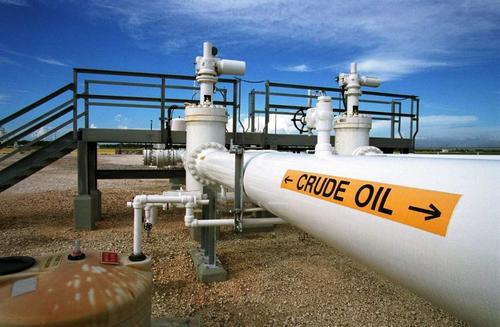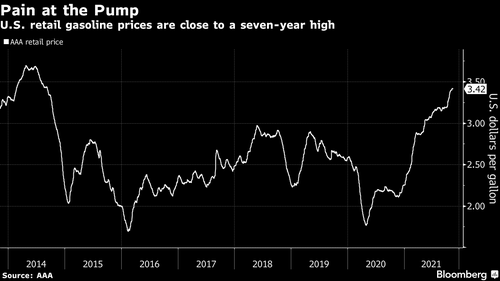The Biden administration is actively debating whether to immediately intervene to lower US energy prices, rather than letting markets ride and hope they settle, as the ‘most popular president in history’ grapples with soaring inflation amid trade and foreign policy matters, according to Bloomberg.

While White House aides have reportedly been lobbying to release the nation’s Strategic Petroleum reserve – or even halting oil exports, several Energy Department officials have pushed back.
For several weeks, a small group of top Biden aides has discussed measures to bring down the cost of gasoline, according to people familiar with the matter. Consensus has so far been elusive, with some Energy Department officials pushing back against tapping the Strategic Petroleum Reserve while White House aides lobby for a release, or the even more radical step of halting oil exports, the people said.
With gasoline at a seven-year high and the US consumer price index hitting a multi-decade high this week, the Biden administration is stuck between trying to boost fuel production to bring down costs, while showing the world how ‘green’ his administration is while the UN climate conference in Glasgow winds down.
“It’s decision time for the Biden administration,” according to Bob McNally, president of consultant Rapidan Energy Group and a former White House official under President George W. Bush.
Those running the show include White House Chief of Staff ‘President’ Ron Klain, National Security Advisor Jake Sullivan, head of the National Economic Council Brian Deese, Energy Secretary Jennifer Granholm and her deputy, David Turk, and finally, energy expert Amos Hochstein who was hired earlier this year to work at the State Department.
Earlier this week, Biden directed the National Economic Council to ‘pursue means to try to further reduce’ energy costs, while asking the FTC to ‘strike back at any market manipulation or price gouging in this sector.’
According to Bloomberg‘s anonymous source, Deese and others are worried more about the economic impact of high inflation and want to deploy extreme measures. Turk, however, has argued against tapping into the strategic reserves, pointing to US forecasts which point to an oil surplus in early 2022.
The State Department is also reportedly against banning experts because it could damage international relationships with countries it’s trying to mend fences with following several years of trade disputes under the Trump administration.
The discussion comes after failed efforts to convince the Saudis, Russia, and other influential OPEC+ members to pump more oil. OPEC+ instead told America to pound sand, after which the Biden administration began debating other options.
Administration officials hope to design a “mechanism” in the next few days that Biden can use to bring oil prices down, according to people familiar with the talks. They cautioned that the president has yet to make a final decision and could still decide against any intervention. But if he does act, the mechanism is likely to include the simultaneous use of several tools and allow a response that would be calibrated according to the reaction of the oil market. -Bloomberg
The US Strategic Petroleum Reserve – the most obvious option, is an underground store of more than 600 million barrels of oil. According to the report, oil traders believe the Biden administration needs to release a minimum of 30 million barrels from the SPR, which would equal roughly one month’s worth of oil imports from OPEC+ nations.
“The U..S could arrange a total effective SPR release of 45-60 million barrels by bringing forward next year’s 20 million barrels of mandated SPR sales, coupled with additional barrels on an exchange basis,” said Citigroup oil analyst Ed Morse, an energy official during the 1970s oil crisis.
White House officials are also looking at how to ease regulatory burdens on US refiners in order to boost production, such as relaxing mandates to mix gasoline with biofuels – a move which would be sure to roil the farming lobby over the reduction in biofuels such as ethanol, which is derived from corn.
“Altering biofuels regulations is a foolproof approach to lowering pump prices, but perhaps less effective from a splashy public relations angle,” said RBC Capital Markets commodities strategist, Helima Croft, a former CIA analyst.
Export restrictions would apply to either crude oil or gasoline – an option floated by Democratic Senators including Elizabeth Warren and Ed Markey of Massachusetts.
In recent months, the US has exported nearly 3 million barrels per day, more than Kuwait produces. To halt or restrict shipments now would cause chaos in the global energy markets, vs. tapping into the strategic reserve.
“SPR release and export bans are less effective policies for tackling high gasoline prices, but highly effective from a publicity perspective,” said Croft.
Whatever happens, Greta will not be happy.
by Tyler Durden
Join: 👉 https://t.me/acnewspatriots
The opinions expressed by contributors and/or content partners are their own and do not necessarily reflect the views of AC.NEWS
Disclaimer: This article may contain statements that reflect the opinion of the author. The contents of this article are of sole responsibility of the author(s). AC.News will not be responsible for any inaccurate or incorrect statement in this article www.ac.news websites contain copyrighted material the use of which has not always been specifically authorized by the copyright owner. We are making such material available to our readers under the provisions of “fair use” in an effort to advance a better understanding of political, health, economic and social issues. The material on this site is distributed without profit to those who have expressed a prior interest in receiving it for research and educational purposes. If you wish to use copyrighted material for purposes other than “fair use” you must request permission from the copyright owner. Reprinting this article: Non-commercial use OK. If you wish to use copyrighted material for purposes other than “fair use” you must request permission from the copyright owner.
Disclaimer: The information and opinions shared are for informational purposes only including, but not limited to, text, graphics, images and other material are not intended as medical advice or instruction. Nothing mentioned is intended to be a substitute for professional medical advice, diagnosis or treatment.























![Tucker Carlson Released an ALARMING Message … [Published Yesterday]](https://ac.news/wp-content/uploads/2024/04/download-3-120x86.jpg)
























Discussion about this post